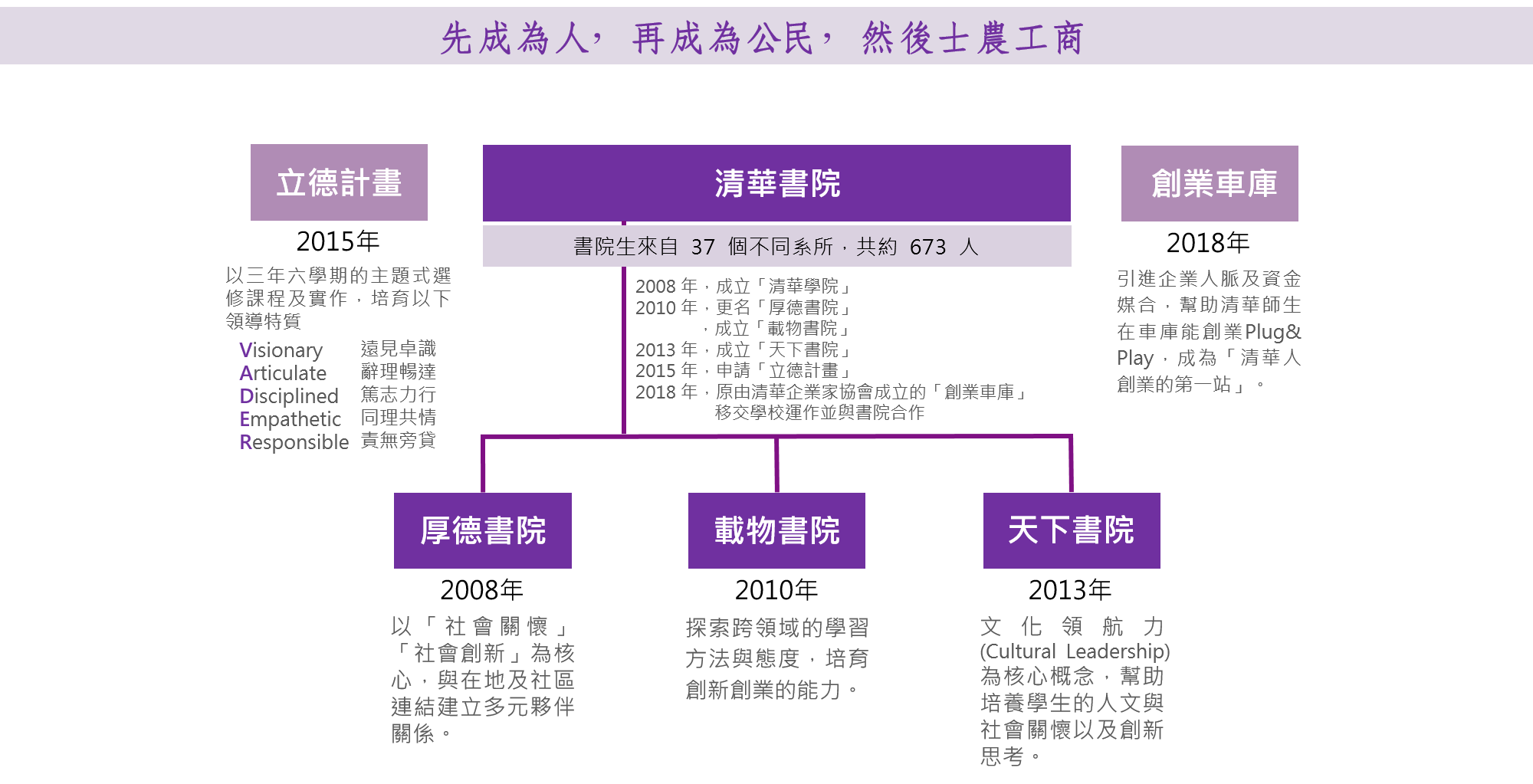書院沿革
一、源起 Origin
2007年5月,時任校長的陳文村教授組團出訪國外知名學府,瞭解住宿學院的理念與作法,返校後,校方隨即針對校級教育目標、校園生活、共同必修課、通識教育進行全面檢討,提出整體改進方案,陸續施行。有關校園生活部分,即以住宿教育的改善做為其中一個因應措施,2008年2月正式成立的「清華學院」為本校第一個結合生活與學習的宿舍,既是宿舍也是學院。
學院成立之初,對於台灣當下大學生有二個判斷:第一,多數大學生缺乏對自我的探索能力,大學四年經常沒有真正協助學生探索自己的人生方向,發展獨立思考、思辨價值的能力;第二,多數大學生與社會母體缺乏深刻的連結,無法感受自己的存在對他人、對社會的意義,形成自己的基本價值。因此第一所成立的「清華學院」教育目標為「先成為人,再成為公民,然後士農工商」。
「成為人」意為了解自己的興趣、釐清自己的基本價值,發展自己的思考與想法。「成為公民」意為了解自己的動機與基本價值,願意和他人溝通對話,透過團隊力量改變社會現況,產生對社會的影響力。「士農工商」意為從自己的興趣出發,以社會關懷為定位,時時與專業學習相互參照,擴展自己的生涯圖像。
In May 2007, Professor Chen Wenchun, then the principal, organized a delegation to visit universities overseas to learn about the concepts and practices of Residential Colleges. After returning to school, the school conducted a comprehensive review of school-level educational goals, campus life, standard compulsory courses, and general education, put forward an overall improvement plan, and implemented it one after another. Regarding campus life, the improvement of Residential Education is one of the corresponding measures. The “Tsinghua College,” officially established in February 2008, is the first dormitory that combines living and learning in Taiwan. It is both a dormitory and a college.
二、沿革 Timeline
2008年 成立「清華學院」
2010年 成立「載物書院」,原「清華學院」改為「厚德書院」
2013年 成立「天下書院」
2015年 成為本校正式二級單位「住宿書院」,併入「清華學院」(原共教會)
2008, established of "Tsinghua College".
2010, established of "Tzai-Wu College", Tsinghua College renamed "Hou-De College".
2013, established of "Tian-Xia College" (Global Program).

三、書院介紹 Residential College Introduction
厚德書院 Hou-De College
「清華學院」於2010年改名為「厚德書院」。書院以「自我探索」、「社會關懷」、「社會創新」為核心,多元、跨域為學習主軸。在這個社會關懷與公民參與已成為現代人基本素養的社會,厚德書院鼓勵同學嘗試將專業融進生活領域,期待開啟創造性的連結。院生在「自我探索」與「社會關懷」的過程中,以「社會創新與適切科技」,回應來自真實世界的需求。在書院中,培養自己自主學習,獨立思考與溝通對話的能力,成為對自己、他人、社會有影響力的年輕人。
"Tsinghua College" was renamed "Hou-De College" in 2010. The academy takes "self-exploration," "social care," and "social innovation" as the core, and multi-disciplinary and cross-domain learning as the main axis. In this society where social care and civic participation have become the basic qualities of modern people, Hou-De College encourages students to try to integrate their majors into the realm of life, looking forward to opening up creative connections. In the processes of "self-exploration" and "social care," the students respond to the needs of the real world with "social innovation and appropriate technology." In the academy, cultivate the abilities of self-directed learning, independent thinking, communication, and dialogue, and become a young person with influence on themselves, others, and society.
載物書院 Tzai-Wu College
2010年本校成立各院的院學士班並開始招生,鼓勵學生跨領域、雙專長主修,為提供院學士班學生一個共同生活、交流的住宿平台,因而成立第二所書院-載物書院,由生科系呂平江教授擔任召集人。新成立的載物書院致力於發展豐富的跨領域學習環境、支持院生持續發展跨領域的思維方式。賀陳弘校長於2014年上任後,著重創新、創業方向,因此載物書院在原有的基礎上,漸漸加入新增培育具有產業視野的創新人才的目標。
In 2010, the school established the bachelor's classes of each college and began to recruit students, encouraging them to major in cross-field and double-specialization, in order to provide an accommodation platform for students in the bachelor's class to live and communicate together, so the second academy, Tzai-wu College, was established. Prof. Lv Pingjiang from the Department of Biological Sciences serves as the convener. The newly established Tzai-Wu College is committed to developing a rich interdisciplinary learning environment and supporting students to continuously develop interdisciplinary thinking. After President He Chenhong took office in 2014, he focused on innovation and entrepreneurship. Therefore, Tzai-Wu College gradually added the goal of cultivating innovative talents with an industrial vision to its original mission.
天下書院 Tian-Xia College (Global Program)
2013年9月,時任本校副校長之馮達旋教授負責規劃籌備與執行天下書院,並招收第一屆院生。天下書院國際化的養成教育以文化領航力(Cultural Leadership)為核心概念,幫助培養學生的人文與社會關懷以及創新思考,鼓勵院生積極接觸各族群與國家文化的相關知識,由此反思自身成長經驗,並與多元文化元素產生對話。天下書院期許院生能具備在全球移動,和不同脈絡背景的人皆能相互理解的文化溝通能力。
In September 2013, Professor Feng Daxuan, then the vice president of the school, was responsible for the planning, preparation, and implementation of Tian-Xia College and recruited the first class of students. The international development education at Tian-Xia College takes cultural leadership as its core concept, helps to cultivate students' humanistic and social care and innovative thinking, and encourages students to actively contact relevant knowledge of various ethnic groups and national cultures so as to reflect on their own growth experience and dialogue with multicultural elements. The Commonwealth Academy expects its students to have the cultural communication skills to move around the world and understand people from different backgrounds.

